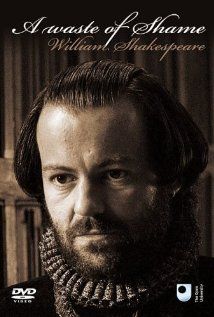Happy Shakespeare’s birthday, everyone! The future playwright made his first appearance on the stage called “life” on 23 April 1564 at Stratford-on-Avon in Merrie Olde England and was baptized three days later. Little did John and Mary Shakespeare think that in his lifetime their infant son William was destined to become the greatest playwright and poet in the English–or indeed, any other–language. Join me in celebrating the 450th anniversary of his birth-it’ll be fun for the whole family! We have cake (even though it’s, ah, cybercake), links, poems, a video clip, and lots of speculation.

Those of us who have reveled in the delight of reading Shakespeare’s sonnets are familiar with the “Dark Lady” sequence (sonnets 127 through 154, according to the sonnet order of 1609, the year they were published). For centuries people have wondered about the identity of the Dark Lady, this woman who apparently drove the most respected playwright in London mad with passion:
Sonnet 147My love is as a fever, longing still
For that which longer nurseth the disease,
Feeding on that which doth preserve the ill,
Th’uncertain sickly appetite to please.
My reason, the physician to my love,
Angry that his prescriptions are not kept,
Hath left me, and I, desperate, now approve
Desire is death, which physic did except.
Past cure I am, now reason is past care,
And frantic mad with evermore unrest;
My thoughts and my discourse as madmen’s are,
At random from the truth vainly expressed:
For I have sworn thee fair, and thought thee bright,
Who art as black as hell, as dark as night.
The three women thought most likely to have been Shakespeare’s dark mistress are Lucy Morgan, also known as “Black Luce,” a well-known prostitute in Clerkenwell; the poet Emilia Lanier, the Earl of Hunsdon’s mistress and later the wife of Alfonso Lanier; and Aline Florio, the wife of linguist and translator John Florio.
Possibly the most anguished, bitter sonnet Shakespeare ever published was this one:
Th’ expense of spirit in a waste of shame
Is lust in action; and till action, lust
Is perjured, murd’rous, bloody, full of blame,
Savage, extreme, rude, cruel, not to trust,
Enjoyed no sooner but despisèd straight,
Past reason hunted; and, no sooner had
Past reason hated as a swallowed bait
On purpose laid to make the taker mad;
Mad in pursuit and in possession so,
Had, having, and in quest to have, extreme;
A bliss in proof and proved, a very woe;
Before, a joy proposed; behind, a dream.
All this the world well knows; yet none knows well
To shun the heaven that leads men to this hell.
Recently my husband and I watched “A Waste of Shame,” a film starring Rupert Graves, which explores the topic of the Dark Lady. In this film she’s thought to be Lucy Morgan, a dark-skinned woman of unusual appearance-not pretty, exactly, but possessing that indefinable quality known as “presence.” We’re meant to think of her as a dark-eyed doxy, but what I saw was a woman doing her best to survive in a harsh world while earning enough to sustain her son in faraway France. There were few ways for women to earn their keep in those misogynistic times, so if she could make money from her looks and her skill at lovemaking, who are we to judge?
The film took all sorts of liberties, especially when Shakespeare contracted the French pox from his French mistress and had to subject himself to remedies that were really hair-raising. The end of the film showed Shakespeare delivering his sonnets to the publisher in 1609 and then going home to Stratford-on-Avon. (In real life, Shakespeare went home for good in 1613.) I must say, never have I thought, “It’s only a movie” with such gratitude as the film drew to a close.
Not much is known about Emilia Lanier (1569-1645). Five years younger than Shakespeare, she apparently was the fourth woman in English history to publish a book of poetry. Perhaps Lanier was Shakespeare’s Dark Lady and perhaps she wasn’t. There’s simply no proof.
The third candidate for the role of Shakespeare’s Dark Lady is Aline Florio, the wife of linguist and translator John Florio. While her husband translated the work of Montaigne, Aline fooled around with his friends. She was supposed to have been “narcissistic, self-centered, and licentious,” which pretty much describes half the human race even now. The poor thing isn’t here to defend herself, so let us leave it at that.
In closing, one cannot do better than to quote from Howard Jacobson’s article in The Telegraph:
It’s possible that had there been no Dark Lady, had Shakespeare never wandered into Clerkenwell or stolen reechy kisses from the wife of a scholar too busy translating Montaigne to notice, these sonnets about loathing what you love, about believing what you know to be untrue, about the falsity at the very heart of sexual desire, would not have spoken to us with such disquieting force. But there’s always another Dark Lady. Isn’t that what these poems proclaim: that erotic love is full of pain and contradiction, an eternal search for an anguish one cannot bear and cannot bear to be without? We diminish them by making them the story of an actual affair. We diminish thought, we diminish imagination, and we diminish art.
Amen to that.

13 comments